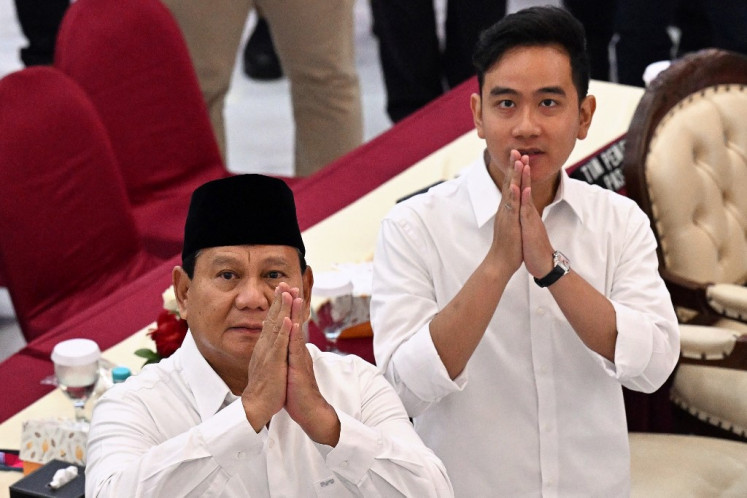KPK's role in doubt as new law takes effect
Thursday marks the day when the controversial revision to the Corruption Eradication Commission (KPK) Law officially comes into effect, raising the question as to what will happen to the country’s leading corruption-fighting agency under the new legislation
Change Size

T
span>Thursday marks the day when the controversial revision to the Corruption Eradication Commission (KPK) Law officially comes into effect, raising the question as to what will happen to the country’s leading corruption-fighting agency under the new legislation.
By default, the revised law takes effect 30 days after being passed by the House of Representatives as President Joko “Jokowi” Widodo has yet to issue a government regulation in lieu of law (Perppu) to revoke the bill, which many observers have warned will weaken the antigraft body.
Ifdhal Kasim from the Executive Office of the President said on Wednesday that the President was still considering several matters before making any decision with regard to the KPK Law revision.
“The President still needs to talk with representatives of all political parties before taking the decision. However, this talk has yet to take place because of Pak Jokowi’s tight schedule ahead of his inauguration,” Ifdhal told The Jakarta Post on Wednesday, referring to the presidential inauguration on Oct. 20.
Aside from issuing the Perppu, he added that the President could take other measures, including pushing for a judicial review at the Constitutional Court.
The House passed the new KPK bill last month despite criticism from the general public that the revision contained articles that would weaken the commission. It later ignited a wave of online and offline protests across the country, mainly staged by university students who called on President Jokowi to issue a Perppu, among other demands.
Many experts, including current KPK leaders, believe the revised law is part of efforts to weaken the antigraft body. It mandates the formation of a supervisory council to oversee the KPK and would require the commission to obtain wiretapping, confiscating and search warrants from this council.
The revision also turns the KPK into a government body, which antigraft activists fear would diminish the agency’s independence and effectiveness as well as preventing it from investigating cases that involve key government officials, businessmen and politicians.
Such a provision might also hinder the KPK in conducting operations to catch graft suspects red-handed in the future, said KPK chairman Agus Rahardjo.
“According to the new law, KPK commissioners are no longer investigators and prosecutors; thus, there might be no operation to arrest officials suspected of committing corruption anymore,” Agus said on Tuesday, as quoted by Antara news agency.
Another KPK commissioner, Laode Muhammad Syarif, said the new law might leave the antigraft body in limbo as the supervisory council had yet to be formed.
“We can still use the existing law to perform our duties given the lack of such a council, so we can still perform our duty of, among other things, wiretapping and raids against graft suspects,” Laode told journalists recently.
“However, we still hope the President could delay the signing of the revision by issuing the Perppu or some other way, because the revised law is dubious,” he went on to say.
Dadang Trisasongko of Transparency International Indonesia (TII) said the new law might disrupt the KPK’s investigations into ongoing corruption cases.
“It is reasonable to expect the KPK to rush through raids and investigations against several graft suspects in the next several days, because it might be the last time the commission can do that under the existing law,” Dadang said.
He referred to a series of arrests made by graft busters since Monday — three days prior to the day the revised law is due to take effect. On Monday, KPK investigators arrested the regent of Indramayu, West Java, Supendi, over allegations of bribery related to several infrastructure projects in the regency. He was later named a suspect.
On Tuesday, the antigraft body launched operations in two different cities, namely Medan in North Sumatra and Samarinda in East Kalimantan. Medan Mayor Dzulmi Edin was among the arrested individuals in Medan, while investigators arrested Refly Rudy Tangkere the head of the regional road authority (BPJW) XII in Samarinda.
Ifdhal brushed off the concerns, saying the KPK would be able to do its job according to the existing KPK Law, as long as the supervisory council had yet to be formed. For example, investigators would only need to secure permission for wiretapping from KPK commissioners rather than the council.
On the brighter side, Dadang said hope remained that the antigraft body could still do its work in eradicating corruption as usual, at least until December — the month when the current KPK leaders will step down as their terms end.
“They should prioritize completing investigations into cases implicating high-profile figures, rather than starting new ones that need them to launch raids, wiretaps or evidence seizures. This is the most realistic thing to do right now,” the TII secretary-general said.









